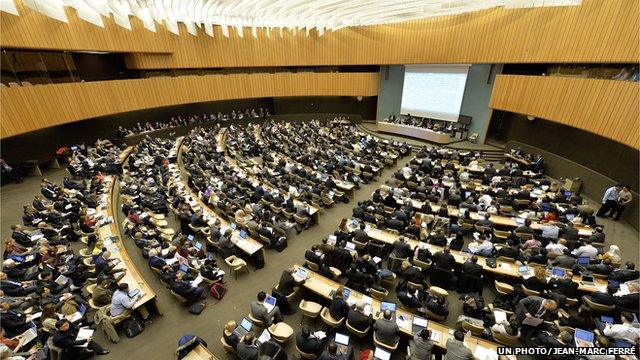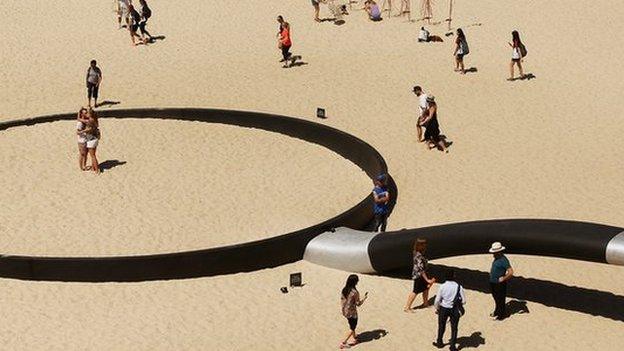UN agrees draft text for Paris climate summit
- Published

Work is continuing on text aimed at a new climate change agreement by the end of the year
UN climate talks in Geneva have ended with agreement on a formal draft negotiating text for the summit in Paris in December.
The document, which runs to 86 pages, builds on negotiations in Peru last year.
The Swiss meeting set out to create a draft for consideration at the Paris talks.
The aim is to have a new global climate agreement in place by the end of 2015.
The latest climate talks, which started on Sunday, focussed on finalising a draft negotiating text for the Paris summit.
The six-day conference in the Swiss city was the first formal gathering since the Lima climate summit in December.
"I am extremely encouraged by the constructive spirit and the speed at which negotiators have worked during the past week," said Christiana Figueres, Executive Secretary of the United Nations Framework Convention on Climate Change, external (UNFCCC).
"We now have a formal negotiating text, which contains the views and concerns of all countries. The Lima Draft has now been transformed into the negotiating text and enjoys the full ownership of all countries," she added.

Analysis: Helen Briggs, BBC environment correspondent
The draft text was agreed before the end of the session, in a mood described as "the spirit of Lima". But rather than being slimmed down, the document has more than doubled in size, to contain everything to be discussed in the run-up to Paris.
Delegates acknowledge that the hard work is still ahead, with the real conflicts to come when negotiators seek to "streamline" the text and narrow down the options for limiting a damaging rise in temperatures.
The key political test is the period from March to June, when individual countries announce their plans to reduce emissions.
At the next climate talks in June, real progress will have to be made to resolve issues such as financing the Paris agreement and ensuring that poorer countries get the support they need to adapt to impacts such as flooding.

Three special sessions have been added to this year's schedule of climate meetings. They include talks about "intended nationally determined contributions", the commitments to reduce emissions that are meant to pave the way towards a low-carbon future.
National plans
Governments are expected to submit their national plans by an informal deadline of the period from March to June.
China, the United States and the European Union have already given an indication of their plans.
The UN seeks to limit the increase of the average global surface temperature to no more than 2C (3.6F) compared with pre-industrial levels, to avoid "dangerous" climate change. But scientists warn the Earth is on track for double that target.
The World Meteorological Organization confirmed this month that 2014 had been the hottest year on record, part of a continuing trend. Fourteen out of the 15 hottest years have been this century.
The UNFCCC, based in Bonn, Germany, has 196 parties - including virtually all of the world's nations - and grew from the 1997 Kyoto Protocol for cutting greenhouse gases.
The next meeting will be held in Bonn in June.
- Published16 January 2015
